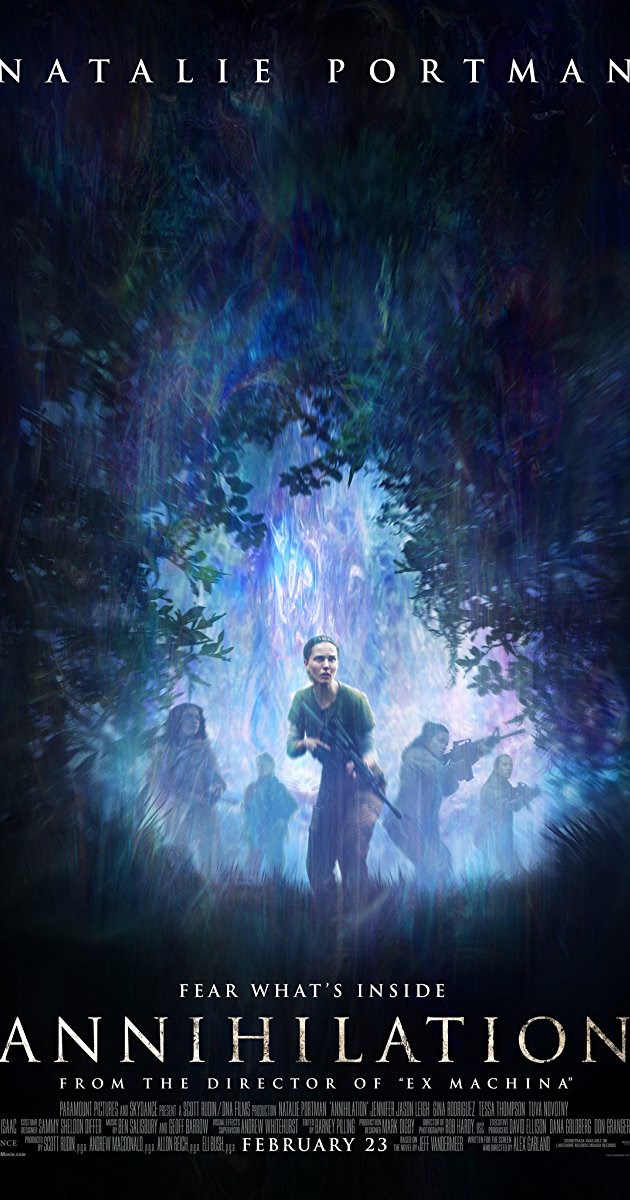If Alex Garland, the writer behind 28 Days Later, Sunshine, and Ex Machina (which he also directed), is known for one thing, it’s for completely whiffing on the climaxes of his stories. From the awkward action-movie-esque ending of Days to the completely aggravating closure to Machina, Garland has a knack for failing to stick the landing. He’s adept at building interesting, detailed sci-fi settings, constantly adding intriguing layers and twists. Unfortunately, he can’t seem to resolve his plots without sacrificing the nuance of the first two acts.
Thankfully, Annihilation breaks that trend. Garland has constructed a mostly-satisfying movie from beginning to end. He builds to a climax that provides enough visceral excitement and answers without destroying the core mystery and questions of the story.
Annihilation is slow, ponderous, deliberate, and just a tad pretentious. Audiences expecting outlandish gore or pulse-pounding action scenes will, for the most part, be disappointed. Annihilation moves at a steady, but glacial pace. At times it skirts the edge of patience-testing boredom. But audiences willing to stick with it will find an engrossing film.
Natalie Portman is blandly serviceable as Lena, a biologist with less personality than the cells she obsesses over. Her husband returns home after disappearing for a year and immediately starts coughing blood. They’re quarantined by the government and Lena is informed of an alien growth in southern America, only known as the Shimmer. It’s mutating the land around it and it’s constantly growing. Lena is conscripted into a small group of scientists to venture into the Shimmer, discover the origin of the growth, and try to stop it. Since this is an Alex Garland film, you can imagine the trip doesn’t go too well for them.
The plot, a standard riff on the Heart of Darkness model, is well-suited for this kind of sci-fi. As the group ventures further into the Shimmer, they encounter bizarrely mutated plants, animals, and people. It’s the perfect format for Garland’s dark imagination to run wild. Scenes involving a human-voiced bear, cross-DNA flowers, and a surgery scene that is quite literally stomach churning (and sure to please gore-hounds) stick with you long after the lights come up. The film is overflowing with creative imagery and Garland’s cinematography captures it nicely, while hiding its obvious budget limitations.
Annihilation’s real strength lies in its details. It crafts a fully-realized world, one that raises countless questions which it refuses to answer. To divulge any of them would be a spoiler. These aren’t frustrating, plot-hole questions; these are the fun kind of queries to debate with people on the way out of the theatre. The film isn’t chock-full of original philosophical questions like the truly great sci-fi films, but there’s more than enough here to chew on.
One wishes Garland’s writing talents extended to his characters and dialogue. Natalie Portman is as dull as ever as Lena, a character who, outside of a few interesting twists, is a boring cipher. Oscar Isaac tempers his famous charism into a dull monotone as Lena’s husband, which actually works in the context of the story, but isn’t particularly fun to watch. Jennifer Jason Leigh has the most interesting character and her arc has some seriously good payoff. Everyone else is wallpaper.
Annihilation is probably doomed to bomb in front of mainstream audiences. It’s not a crowd-pleaser or an adrenaline rush. It’s a slow burn of a movie, to be sure, but unlike most ponderous sci-fi snoozers, it’s actually rewarding.




